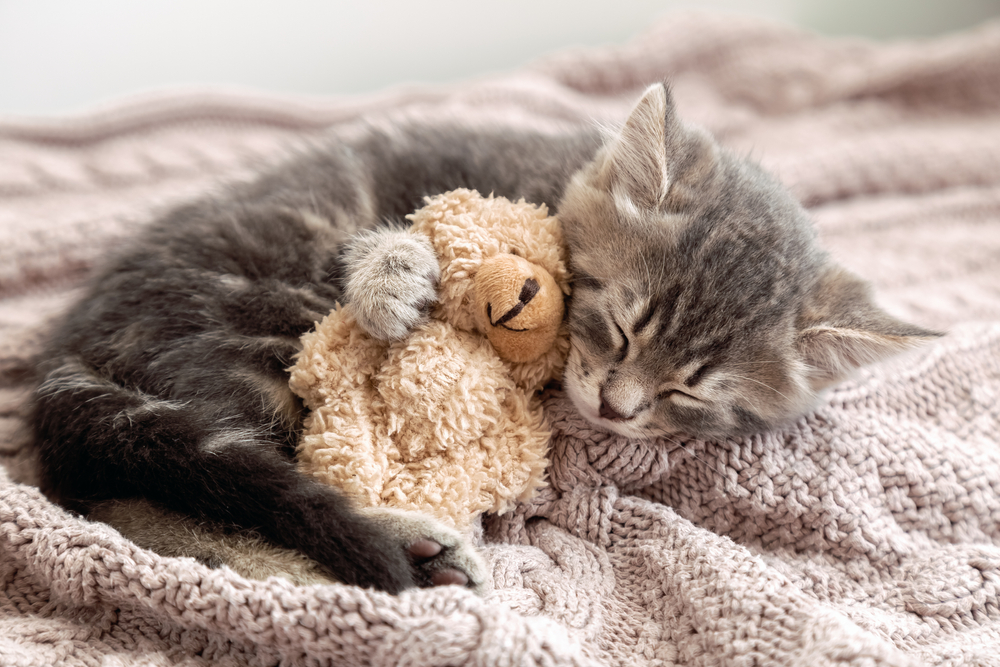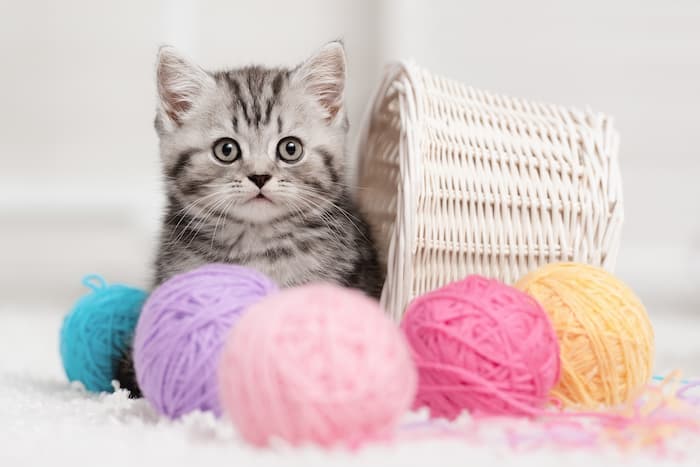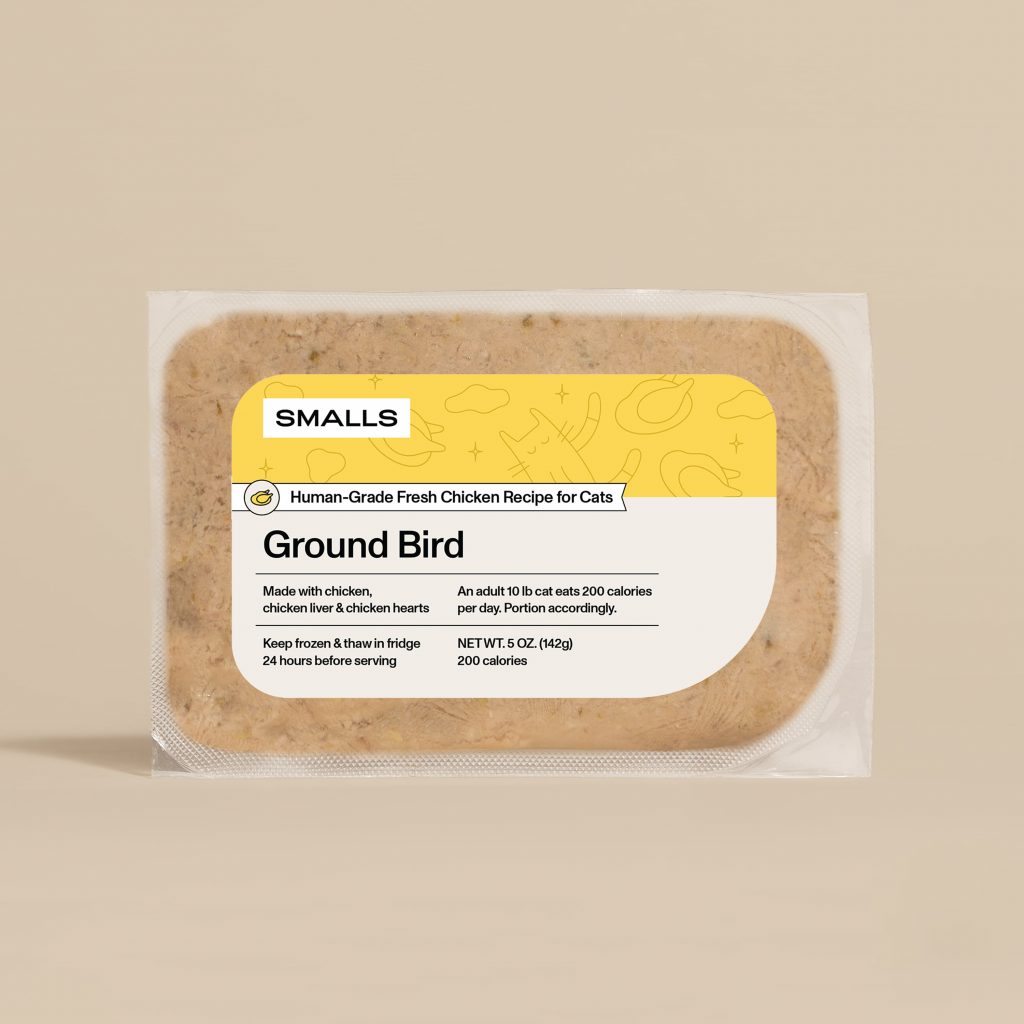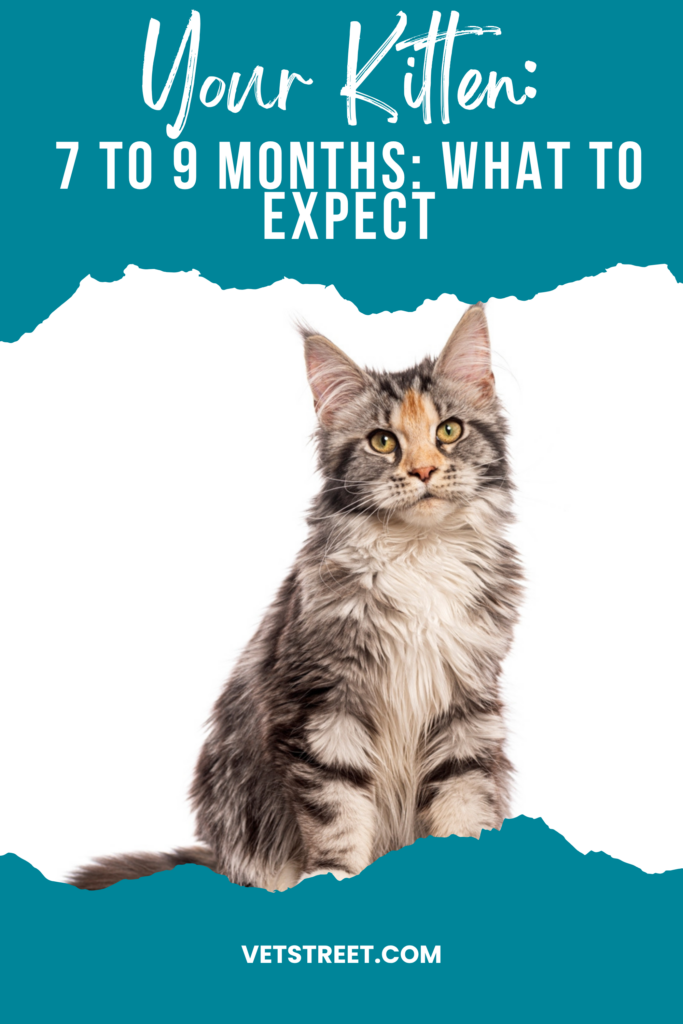Your Kitten: What to Expect at 7 to 9 Months
Updated on June 11, 2025

Being a Good Pet Owner
So you’ve brought home a new kitten — now what? Don’t panic. Despite their reputation for aloof and regal attitudes, cats are social creatures and make loving, affectionate pets. Here is a quick rundown of what you need to know to keep your young cat happy and healthy.
All featured products are chosen at the discretion of the Vetstreet editorial team and do not reflect a direct endorsement by the author. However, Vetstreet may make a small affiliate commission if you click through and make a purchase.
Your Kitten: Physical and Mental Development
At 7 to 9 months old, your cat is considered a young adolescent. He is exploring eagerly, and he is socializing and bonding with people. During this stage, your cat will experience rapid growth, and his baby teeth are now gone, replaced by stronger, adult teeth.
Your young cat will likely sleep a lot, more than 16 hours a day. He will easily find a cozy place to snuggle down, but if you can encourage him to sleep in a cat bed, you may help to contain shedding.
Believe it or not, cats are capable of reproducing as early as 6 months old. So, if your cat is not already spayed or neutered, make an appointment with your veterinarian right away. Male cats may also begin spraying behavior at this stage, which is another good reason to have him neutered, as it will greatly reduce or eliminate this undesirable behavior.
Behavior Changes
Kittens love to play. While your cat’s senses were fully developed by 5 weeks, it takes longer for him to coordinate those clumsy paws. Playing with your cat not only provides him with great exercise, but also strengthens your relationship. Kittens play on their backs with paws waving in the air. As he swats a fluttering feather, he is learning to coordinate clawing and biting.
When shopping for toys, remember that what looks like a toy to a kitten — a balled-up sock or a toilet paper tube — might not look like a toy to you. To keep your cat safe, look for toys free of jagged edges or small, sewn-on parts like eyes or bells, which can be a choking hazard, and always supervise your kitten playing with string toys, as they can cause serious injury. Whether your cat’s toys are homemade or store-bought, changing them out regularly will keep your kitten interested and excited about playtime.
During this stage, most cats will easily accept dogs or other pets. But be careful: Your cat is not able to distinguish between enticing a dog to chase him in play and presenting himself as a prey animal to a predator. You must be prepared to supervise this interaction and protect your cat at all times.

Health and Nutrition
By this time, your kitten should have been examined by your veterinarian and given a series of vaccinations. However, in many cases, a kitten’s medical history is a mystery. Your veterinarian may recommend additional vaccinations or tests depending on your cat’s lifestyle and history.
Another major consideration in caring for your kitten is food selection. At this stage your cat can be transitioned from kitten food to a high-quality adult cat food. Most experts agree that a premium brand is best, primarily because the quality of the ingredients is better. Generic and bargain-brand foods tend to be less consistent in their quailty. Protein sources in premium foods are highly digestible, which means your cat uses more of the protein. The result? You will feed less and have less cat waste to clean up.
Cat foods are available in both dry and wet varieties. Some cats prefer one over the other, and many cats get both — either option is perfectly fine. Dry food tends to be less expensive than canned food and can be left out throughout the day for cats who like to nibble. In contrast, canned food should only be left out for 20 minutes or so and removed if the cat doesn’t eat it all. The crunchiness of dry food against your cat’s teeth helps slow down dental tartar buildup, but the higher water content in canned food can be helpful for cats who don’t drink enough water, so both types of diets have advantages. Of course, always keep fresh water available at all times.
One of the most significant decisions a pet parent makes is what to feed their cat. A convenient way to receive human-grade cat food delivered right to your doorstep is with a subscription to Smalls Food For Cats. You’ll never have to worry about running out of food, and your growing kitten will enjoy their choice of turkey, chicken, beef, or fish.

It is also essential to monitor your kitten’s food intake. If he decides to not eat a meal, that’s OK. However, if he does not eat within 24 hours, consult your veterinarian. Cats who stop eating may be ill, and are at risk of developing severe liver disease. Cats can actually starve themselves to death.
Pet Health Insurance Can Help
Unexpected veterinary bills can make caring for your pet challenging. Don’t let financial stress get in the way of making the best decisions for your pet. Pet health insurance can cover surprise costs such as veterinary visits, prescription medications, and life-saving procedures.
Review personalized options for your pet below:
Training Tips
Fortunately, the most important training your kitty will need will likely be the easiest: how to use the litterbox. The good news is that your kitten is hardwired for this. When you first bring home your kitten, immediately set him in the litterbox. He will likely walk away. However, now he knows where the potty is. Wasn’t that easy? If your kitten goes outside the litterbox, clean up the mess with a good enzymatic cleaner, and put any poop into the litterbox. This should signal to your cat where to use the potty.
What type of litter you use is up to your cat. Your options include scented or unscented, clay, clumping clay, crystal or silica gel, corn or wheat, or paper or wood-pellet litter. All of them have their pros and cons, so ask your vet’s advice on this if you aren’t sure which way to go. When you find a litter that your cat likes, stay with it. Cats love consistency. Put the litterbox in an out-of-the-way yet accessible location. Cats prefer privacy and need to avoid being disturbed by kids or other pets.
Training your cat to respond to certain words or sounds will make life with your cat safer and more fun. Your cat should recognize his name and respond when you call him. Remember, you cannot train a cat using force; harsh training techniques will scare him and teach distrust. Reward his cooperation positively. A scratch behind the ears along with verbal praise will work wonders.
Bonus Training Tips for Kittens 7 to 9 Months Old
- Redirect your kitten, don’t scold or punish. If she scratches you or furniture, redirect her to a toy or something more appropriate.
- Start harness training. Get her used to wearing a harness in your line of vision in the house. This way, you will be all set for carrier transport or outdoor leashed walks.
- Use high-value kitten treats. The more your kitten wants the treat, the more likely she will train with you.
- Keep sessions short and fun. Never make the sessions very long. Most experts agree than 5 to 10 minute sessions work best.
- Clicker training is an option. A lot of cat parents like clicker training, as younger kittens tend to pick up on these cues.
Remember, spending time getting to know your kitten is the best way to discover the fun he has in store.




